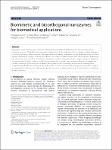Item Infomation
Full metadata record
| DC Field | Value | Language |
|---|---|---|
| dc.contributor.author | Keum, Changjoon | - |
| dc.contributor.author | Hirschbiegel, Cristina-Maria | - |
| dc.contributor.author | Chakraborty, Soham | - |
| dc.date.accessioned | 2023-09-14T08:13:22Z | - |
| dc.date.available | 2023-09-14T08:13:22Z | - |
| dc.date.issued | 2023 | - |
| dc.identifier.uri | https://link.springer.com/article/10.1186/s40580-023-00390-6 | - |
| dc.identifier.uri | https://dlib.phenikaa-uni.edu.vn/handle/PNK/9004 | - |
| dc.description | CC-BY | vi |
| dc.description.abstract | Nanozymes mimic the function of enzymes, which drive essential intracellular chemical reactions that govern biological processes. They efficiently generate or degrade specific biomolecules that can initiate or inhibit biological processes, regulating cellular behaviors. Two approaches for utilizing nanozymes in intracellular chemistry have been reported. Biomimetic catalysis replicates the identical reactions of natural enzymes, and bioorthogonal catalysis enables chemistries inaccessible in cells. Various nanozymes based on nanomaterials and catalytic metals are employed to attain intended specific catalysis in cells either to mimic the enzymatic mechanism and kinetics or expand inaccessible chemistries. Each nanozyme approach has its own intrinsic advantages and limitations, making them complementary for diverse and specific applications. | vi |
| dc.language.iso | en | vi |
| dc.publisher | Springer | vi |
| dc.subject | Nanozymes mimic | vi |
| dc.subject | govern biological processes | vi |
| dc.title | Biomimetic and bioorthogonal nanozymes for biomedical applications | vi |
| dc.type | Book | vi |
| Appears in Collections | ||
| OER - Khoa học Vật liệu, Ứng dụng | ||
Files in This Item:

